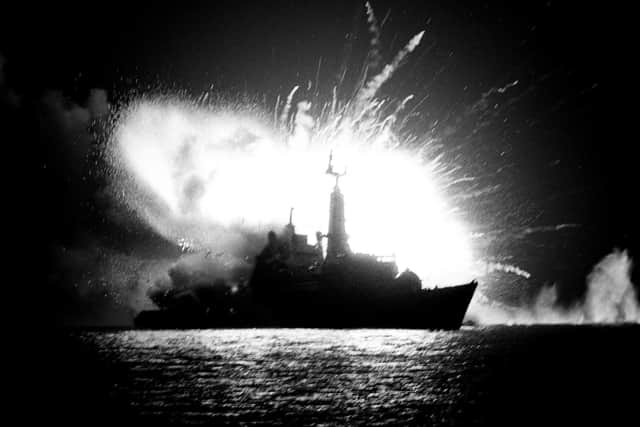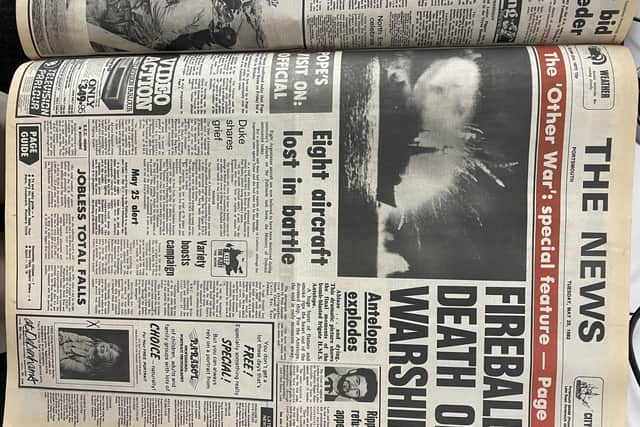Falklands 40: Headlines from The News, Portsmouth on May 25, 1982
and live on Freeview channel 276
Fireball death of warship, Antelope explodes
A huge burst of flames and smoke rips the heart out of the doomed ship. For the Antelope, the end is only moments away.
A huge fireball had swept through the vessel after a 500lb bomb which had failed to explode on impact blew up as a bomb disposal expert tried to make it safe. He was killed and seven other crew members were injured.


Advertisement
Hide AdAdvertisement
Hide AdAs the fires became uncontrollable, Antelope was abandoned by her crew of 175.
It was the Antelope’s fate to face the brunt of attacking Argentinian war-planes which had broken through the task force’s defensive air cover.
She responded in heroic fashion, but suffered direct hits.
BBC reporter Brian Hanrahan witnessed the attack and described the final hours of the Antelope.


‘Antelope went the way of the two other British ships lost so far, destroyed in a fire started by enemy action.
Advertisement
Hide AdAdvertisement
Hide Ad‘She was hit on Sunday afternoon when the Argentinian air force resumed its raid on San Carlos Bay. Although only a few planes broke through the defensive screen, Antelope was badly damaged.’
Describing her last moment, Hanrahan said: ‘At dawn, it was still glowing red, the side ripped open, everything above deck level reduced to mangled black metal.
‘On Monday afternoon, Antelope broke her back and as the sea rushed in a white cloud erupted, the hot metal was finally cooled.
‘The bows and stern rose from the surface and then slowly sank.’
Eight aircraft lost in battle
Advertisement
Hide AdAdvertisement
Hide AdEight Argentinian aircraft are now believed to have been destroyed during yesterday’s attacks on the Falklands task force, the Ministry of Defence announced today.
But a spokesman said there had been no reports of any damage to Canberra, although the Argentinian news agency Telam said she had been hit by four bombs.
In a brief statement the Ministry announced renewed attacks by Royal Navy and Royal Air Force Harriers on Port Stanley airfield during yesterday’s action.
“All our aircraft returned safely,” it said. “On the ground there have been no reports of contact with Argentine forces.”
Duke shares grief
Advertisement
Hide AdAdvertisement
Hide AdThe Duke of Edinburgh has sent a telegram of sympathy to the naval city of Plymouth, now reeling from the double blow of the loss of two of its frigates, H.M.S. Ardent and H.M.S. Antelope.
The Duke’s message, sent to the Lord Mayor of Plymouth (Mr Reg Scott), arrived before news of the loss of Antelope was confirmed.
It read: “I would be grateful if you could extend my deepest sympathies to the families in Plymouth which have been bereaved as a result of the loss of H.M.S. Ardent.
“No community knows better the dangers of life at sea, and I am quite sure that the sympathy and support from all the other families will bring comfort to those in sorrow.”
Ongoing plan for updating
Advertisement
Hide AdAdvertisement
Hide AdPortsmouth City Council hopes to take a big step forward in the world of new technology with major plans to update its computer system.
New equipment, which will speed up services for the benefit of ratepayers, is to be leased from IBM at a cost of about £1m over a five-year period.
At a meeting of the strategy sub-committee today, members were told that the present computer had reached its capacity level and could not handle any more paperwork; the new machine would have four times the memory capacity and six times the speed capacity.